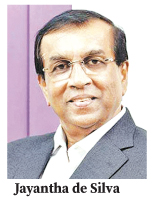

The move to bring in all information of State entities into one data base has been given the thumbs up by IT experts and the country as a whole, as a timely initiative to do away with cumbersome, time-consuming and costly procedures followed in most public establishments which are hurdles to expedite economic growth in the country.
All personal information such as National Identity cards, driving licences, immigration and emigration documents, registration of births and deaths will be brought under one data centre, an initiative of President Gotabaya Rajapaksa to streamline operations of State institutions and minimise the cost and hassle the public has to undergo in obtaining documents.
 Information and Communication Technology Agency (ICTA) Chairman Jayantha de Silva said all information in government entities will be under one common ‘Cloud’ managed by ICTA that will enable people to interact with institutions with one interface.
Information and Communication Technology Agency (ICTA) Chairman Jayantha de Silva said all information in government entities will be under one common ‘Cloud’ managed by ICTA that will enable people to interact with institutions with one interface.
IT experts while welcoming the move which was long overdue, said the cost and the hassle everyone has to go through could be slashed if there is a mechanism to capture data at one location.
“Having all information in one place will help avoid circulation of erroneous and duplicitous information,” de Silva said.
As intended by the President in initiating the move, the project aims at creating inter-connectivity among ministries, departments and semi-government organisations which is vital in the development process of the country. The attention of the President was drawn to assigning some of the projects currently under the purview of the Ministry of Information and Communication Technology to the ministries or institutions which are directly responsible for the outcome of the program. The case of handing over the school computer labs project to the Ministry of Education was cited as an example. However, the challenge is to change the mindset of public sector workers who are slow to change, less agile and non innovative.
“The government Cloud is in place with the availability of all data. The problem is the willingness and commitment to shed old skin and emerge afresh with the winds of change that is taking place all across the world,” De Silva said, adding that the economic growth of the country has been lagging due to lack of innovation and dynamism.
The ICTA board comprising members who are experts in the industry has undertaken the task with the broad aim of accelerating the digital transformation in the country through a host of projects from grass-root level to the highest state establishment in the country. However, as easier said than done, the project involves substantial training, cost and the buy-in of all stakeholders too for its success. “As the collaboration and support of everyone is crucial for any project, this too needs the unstinted commitment of all if not it will be mere rhetoric,” de Silva said.
IT experts said the country needs to be mindful and be proactive to be in line with cyber physical systems if not the country would stand to lose heavily.
Experts said physical and data security should be given top priority as in most developed countries that have made great strides in technology to ensure national security and boost productivity across all key economic sectors. “We have the capability and systems in place but they have not been put to good use. The ‘Ownership’ concept must come into play for greater accountability. Work ethics and decisions must come from the top. This is lacking in the country,” de Silva said adding, that the ICTA strategic plan to cater to the vision of the government will be completed next week. The ICTA has launched over 100 projects which will be looked into and prioritised according to resource availability.
“We need to revisit the projects and map out resource needs which will be done soon,” de Silva said.
